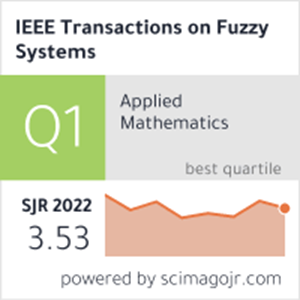Fuzzy Federated Learning for Privacy-Preserving Detection of Adolescent Idiopathic Scoliosis
IF 11.9
1区 计算机科学
Q1 COMPUTER SCIENCE, ARTIFICIAL INTELLIGENCE
引用次数: 0
Abstract
As a distributed intelligent paradigm, fuzzy federated learning (FuzzyFL) can reduce the uncertainty and noise of biomedical data and is suited to enhance the accurate detection of adolescent idiopathic scoliosis (AIS). The advanced paradigm requires the hospitals to share the gradient of the fuzzy deep neural network (FDNN) rather than biomedical data. Not only that, the recent research works have been devoted to privacy-preserving FuzzyFL for secure AIS detection that adds differential privacy-based noise to the gradients against membership inference attack, attribute inference attack. However, a novel reconstruction attack called gradient leakage attack (GLA) on inferring biomedical data over the gradient brings the security challenges to FuzzyFL and, thus, has a negative influence on AIS detection. It is natural to ask a fundamental question: Can differentially private FuzzyFL for AIS detection over biomedical data defend GLA? In this article, we construct a privacy-preserving FuzzyFL framework called模糊联合学习用于青少年特发性脊柱侧凸的隐私保护检测
作为一种分布式智能范式,模糊联合学习(FuzzyFL)可以减少生物医学数据的不确定性和噪声,适用于提高青少年特发性脊柱侧弯症(AIS)的准确检测。这种先进的范式要求医院共享模糊深度神经网络(FDNN)的梯度,而不是生物医学数据。不仅如此,近期的研究工作还致力于保护隐私的模糊深度神经网络(FuzzyFL),以实现安全的 AIS 检测,该网络为梯度添加了基于隐私的差分噪声,以对抗成员推理攻击和属性推理攻击。然而,在梯度上推断生物医学数据的一种新型重构攻击--梯度泄露攻击(GLA)--给 FuzzyFL 带来了安全挑战,从而对 AIS 检测产生了负面影响。我们自然会提出一个基本问题:用于生物医学数据 AIS 检测的差异化私有 FuzzyFL 能否抵御 GLA?在本文中,我们构建了一个名为 "PrivateFuzzyFL "的隐私保护 FuzzyFL 框架,为系统评估受到 GLA 威胁的私有 FDNN 提供了一个绝佳的机会。在一组胸部X光图像和四个FDNN的实验中,我们比较了十多种私有模糊联合优化算法的防御效果和效用成本,得出:第一,FuzzyFL中现有的私有FDNN可以为生物医学数据提供一定的隐私保护,抵御GLA;第二,防御效果较好的扰动算法通常会导致FDNN的AIS检测效果变差。
本文章由计算机程序翻译,如有差异,请以英文原文为准。
求助全文
约1分钟内获得全文
求助全文
来源期刊

IEEE Transactions on Fuzzy Systems
工程技术-工程:电子与电气
CiteScore
20.50
自引率
13.40%
发文量
517
审稿时长
3.0 months
期刊介绍:
The IEEE Transactions on Fuzzy Systems is a scholarly journal that focuses on the theory, design, and application of fuzzy systems. It aims to publish high-quality technical papers that contribute significant technical knowledge and exploratory developments in the field of fuzzy systems. The journal particularly emphasizes engineering systems and scientific applications. In addition to research articles, the Transactions also includes a letters section featuring current information, comments, and rebuttals related to published papers.
 求助内容:
求助内容: 应助结果提醒方式:
应助结果提醒方式:


